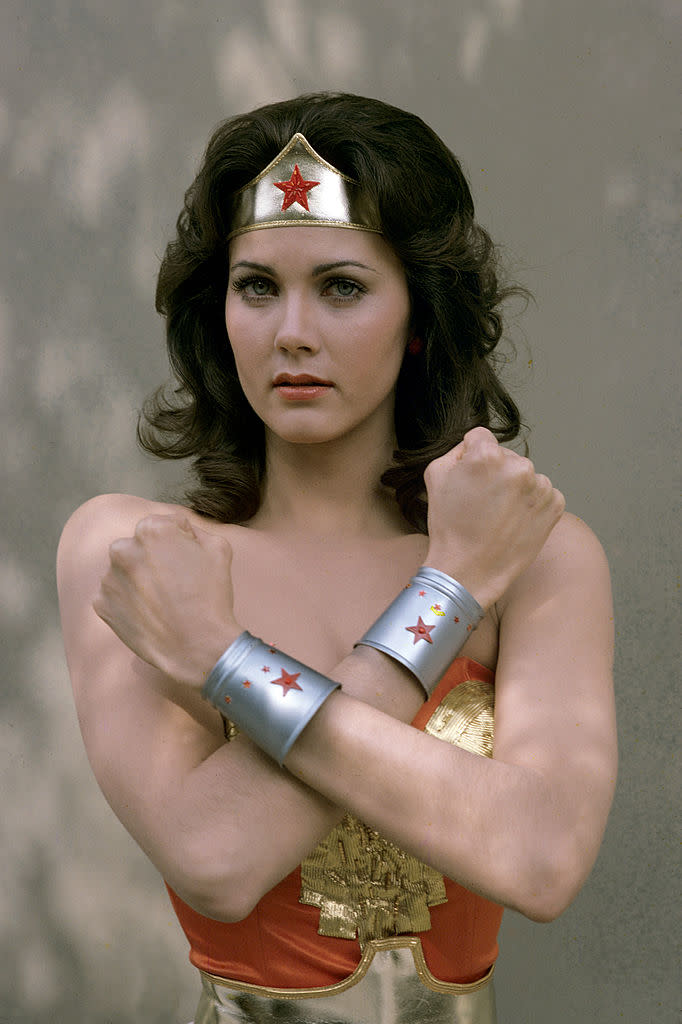Original ‘Wonder Woman’ Lynda Carter Defends the Superhero Against Critics

In case you missed it, the United Nations launched a campaign in October in which it appointed the fictional superhero Wonder Woman as its ambassador for women and girls. At the time, U.N. spokesperson Courtney Simmons released a statement that read, “Wonder Woman stands for peace, justice and equality, and for 75 years she has been a motivating force for many and will continue to be long after the conclusion of her U.N. honorary ambassadorship.”
The U.N. even invited two women who had played Wonder Woman — Lynda Carter, who depicted the character in a 1970s TV show, and Gal Gadot, who will play her in an upcoming film adaptation — to an event celebrating the new supercharged ambassador. A spokesperson for DC Entertainment, which published the original comic, said the brand was “extremely pleased” with the partnership. It seemed like cause for celebration, but the the celebration was short-lived.

In mid-December, the U.N. announced it would be dropping Wonder Woman as its “girl power” ambassador. The decision followed much flack over the choice of the character, which included a petition — signed by more than 45,000 people — that stated, “A large-breasted white woman of impossible proportions, scantily clad in a shimmery, thigh-baring body suit with an American flag motif and knee-high boots” was not a proper role model and did not properly represent “gender equity.”
Now, Carter, the first woman to play Wonder Woman, is coming to defend the superhero’s honor and explain why she is, indeed, a strong role model for women and girls of all races and ethnicities. In an interview with the New York Times, she asked, “who says Wonder Woman is ‘white’? I’m half-Mexican. Gal Gadot is Israeli. The character is an Amazonian princess, not ‘American.’ [Critics are] trying to put her in a box, and she’s not in a box.”
Today in NYC: #WithWonderWoman event focusing on work for gender equality. Take action –> https://t.co/Cel93qk5ai #reallifewonderwoman pic.twitter.com/y5ClFdFME1
— United Nations (@UN) October 21, 2016
When asked about the critiques of Wonder Woman — who is often depicted in a low-cut, tight-fitting uniform — Carter replied, “Yeah, so? Superman had a skintight outfit that showed every little ripple, didn’t he? Doesn’t he have a great big bulge in his crotch? Hello! So why don’t they complain about that?” Carter says she just never saw the character as “super-racy” or “predatory.” She claims that Wonder Woman’s message was akin to “‘You have a problem with a strong woman? I am who I am, get over it,’” adding they never played her “as mousy. I played her being for women, not against men. For fair play and fair pay.”
Carter — who recently starred in Supergirl and Super Troopers 2 and is a recording artist — even rejects the notion of Wonder Woman as a sex symbol, saying that when men approach her to say they had a crush on her when she portrayed the character in the 1970s, “I say: ‘Talk to the hand. I don’t want to know.’” When women approach her to confess how much her portrayal of Wonder Women inspired and empowered them, however, “I hold them in my arms and they cry.” She told the New York Times “that’s really where the fantasy became a reality, where Wonder Woman became something much more than a TV show or a comic book.”
The selection of Wonder Woman as a United Nations ambassador came on the heels of the foundation’s decision to bypass several female candidates for the position of secretary-general and appoint a man instead. Carter suggested the backlash against the campaign might be rooted in the fact that “the U.N. didn’t put a woman in there.”
Carter did give the critics some concessions though. She told the New York Times she agrees that “the issue of gender equality is much larger than any character is, and I understand that a comic book character should not be representative of something that is that important.” This is likely a direct response to Jeffrey Brez, a spokesperson for the U.N., who said, “Some people voiced a concern that they didn’t feel it was appropriate for a fictional character to be representing women and girls.” (Brez also claimed that the decision to pull the plug on the Wonder Woman campaign had nothing to do with the protest, according to the New York Times.)
But the former Wonder Woman stands firm in her belief that it is sexist to paint the superhero as a sex symbol rather than a symbol of female empowerment. “She’s an iconic defender, she’s archetypal. It’s the ultimate sexist thing to say that’s all you can see, when you think about Wonder Woman, all you can think about is a sex object,” Carter told the New York Times.
Carter feels that the depth of Wonder Woman is lost on people who try to sexualize her. She explains that the character was an across-the-board representation of female empowerment, especially when she portrayed her more four decades ago. “There was this idea that inside every woman is a secret self,” she said. “It’s much less about the color of your skin, much less about your height or weight or beauty, but it’s the attitude, the strength of character, the fight for rights: the beauty within, the wisdom within.”
Follow us on Instagram, Facebook, and Pinterest for nonstop inspiration delivered fresh to your feed, every day.

